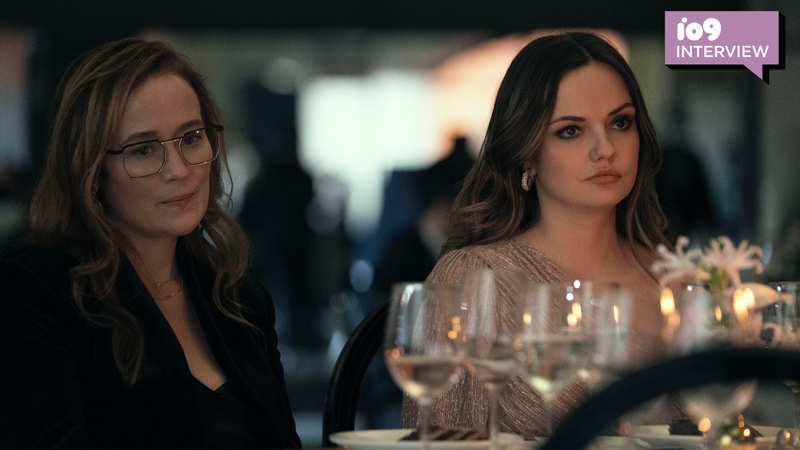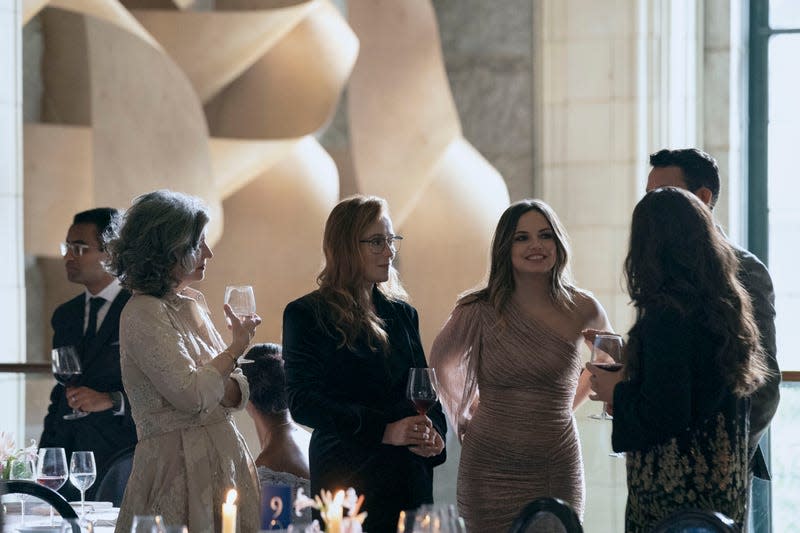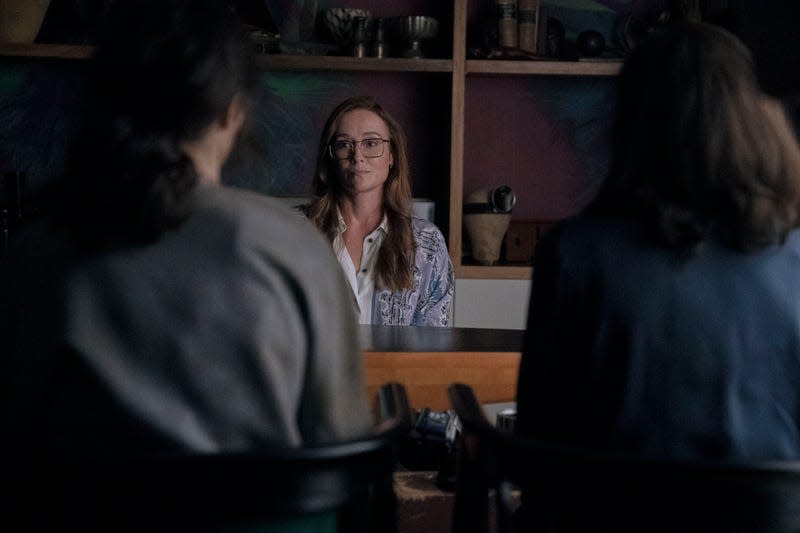Dead Ringers' Power Couple on the Show's Uniquely Unsettling Thrills

Created by Alice Birch and starring Rachel Weisz (twice), Prime Video’s Dead Ringers evolves David Cronenberg’s 1988 squirm-inducing classic about twins whose obsession with each other becomes their downfall. Ahead of the six-episode series’ release on April 21, io9 spoke with two of Dead Ringers’ key co-stars, whose characters help build out the world of Weisz’s increasingly unhinged Drs. Elliot and Beverly Mantle.
Jennifer Ehle (Saint Maud) plays Rebecca Parker, the billionaire drug-company heiress who funds the Mantles’ dream project: a posh birthing center and research lab in Manhattan. Emily Meade (The Deuce) plays Susan, her decades-younger wife, who first brings the Mantles to the Rebecca’s attention, and later pushes for a satellite birthing center to be built in her Southern hometown. Even in a series dominated by Weisz’s striking dual performance, they make quite a memorable pair.
Read more
These Winning Close-Up Photos Show Life That's Often Overlooked
Remembering Enterprise: The Test Shuttle That Never Flew to Space
Cheryl Eddy, io9: Rebecca’s family fortune comes from the drug company responsible for America’s opioid crisis. How has that shaped her outlook on the world and the way she interacts with other people?
Jennifer Ehle: She’s completely different than anybody, certainly, that I’ve ever met. She’s been raised with a level of wealth and privilege, and a sense of being one of the people who is actually keeping the world running and defines which way the world goes and what happens in society next. I think she’s been raised believing that it is part of her right and her destiny and her responsibility to be instrumental in what happens next in society, and in the financial world and in the science world. She feels crucial, on a level kind of like a monarch or something—like a sort of Ayn Rand character. She believes she’s got this kind of objectivism, that there’s nothing but to enjoy life and to influence the world.
io9: We learn a little about their backstory (including that Susan is wife number four), but not really how they met. Did you guys discuss with the writers and each other to sort of work out a foundation for their marriage?
Emily Meade: I don’t know! [To Ehle:] Do you know how they met? I can imagine it was some kind of party... [laughs]
Ehle: We never discussed it! Part of what I love about it all is that there’s no exposition; Alice [Birch] leaves space around the story that you can fill in when you’re watching it and certainly when you’re playing it. We met the first day when we did that first scene, when the Mantle twins meet us for the first time.
io9: How would you describe the relationship between Rebecca and Susan? And how does their dynamic play into their dealings with the Mantle twins?
Meade: I think they’re more similar on a foundational level, the way they see the world, than you would think. Obviously they seem like absolute opposites, but I think they actually balance each other. Maybe they’re portraying good cop, bad cop, but they’re actually both ultimately a bit selfish—they just get to distribute it differently. I think there is also a sincere care there and understanding for each other.
The way that dynamic engages with the Mantle twins is, I’m assuming on her own, Rebecca would probably never be like trying to do something like [fund a birthing center]. It doesn’t really work with Rebecca’s personality to be like, “Hey, let me try to give you this money.” It’s almost like a good con team, where Rebecca gets to sit back and be aloof while Susan pushes and pulls and brings it in. Ultimately, they both benefit from it.

io9: Rebecca is definitely skeptical when she first hears the proposal for funding Beverly’s birthing center and Elliot’s lab. Why do you think she decides to give them the money?
Ehle: I mean, Elliot says that she might be able to delay death. Elliot also says she could delay menopause without end. I think those things are incredibly attractive to Rebecca—financially and just like just cool factor of being the person, the super-multi-multi-millionaire, who finds a way to cheat death or cheat female biology. To have the bragging rights for that would be really great. And meanwhile, it makes her wife happy. Her wife’s in it for the babies. [I think at first Rebecca] assumes that there’s no way on earth [she’ll fund a] birthing center—and then the science gets her.
io9: We meet Susan’s family near the end of the series and there are some surprises that come with that. How would you characterize her relationship with her family?
Meade: She’s obviously a product of it. You can see the overlap between certain elements of her father and Rebecca, and how she thinks nurturing, caretaking energy looks and feels. I think it shows why she’s so arrested in development and sort of odd and has not really developed or grown as a human how one maybe should, considering she had a pretty bizarre father and life. I don’t think she’s the type of person who tried to escape or better [the family situation she grew up in]; I think she just tried to find a way to recreate it in a way that works for her. She hasn’t recognized the ways that it’s not a good family dynamic and she’s just going to keep playing that out for the rest of her life, probably.

io9: When you think about Cronenberg, the immediate genre association is “body horror.” How does your version of Dead Ringers evolve that concept? Do you consider it to be a horror series?
Meade: As far as body horror, I guess it just brings in more types of body horror or more layers of it? It becomes far more about the female experience than the Cronenberg one. I feel like that one’s more about addiction; in this one, the addiction part is kind of a smaller part of that horror. It’s definitely a bit creepy and disturbing. Would it be horror straight up? I guess “psychological thriller” would be what I would probably pitch it as
Ehle: Yeah, I think “psychological sexual thriller,” I would say more than than horror. I think there are horror elements in it. But I think unless something is a full-out horror series or horror film, if you sell it or try to sell it as horror, you end up with—there are people who are really hardcore and they will only be disappointed if they come looking for horror. I think this is more nuanced than that.
io9: Yet, disturbing all the same.
Ehle: Definitely. I don’t think anybody would be disappointed coming to look to be disturbed, because it’s really disturbing.
Dead Ringers streams on Prime Video starting April 21.
Want more io9 news? Check out when to expect the latest Marvel, Star Wars, and Star Trek releases, what’s next for the DC Universe on film and TV, and everything you need to know about the future of Doctor Who.
More from Gizmodo
Sign up for Gizmodo's Newsletter. For the latest news, Facebook, Twitter and Instagram.
